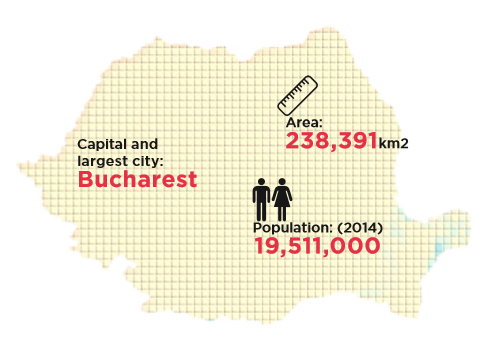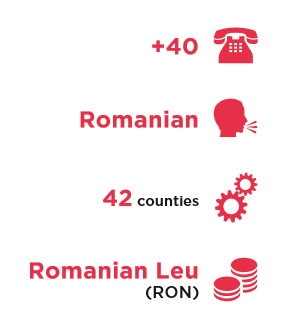Romania
Find support in this market.


Ease of trading across borders
Importing a standard container of goods into Romania requires:
Introduction
Romania is the ninth largest country of the European Union by area, and has the seventh largest population of the European Union. Its capital and largest city is Bucharest - the sixth largest city in the EU. Romania has a developing, upper-middle income market economy. Joining the EU on 1st January 2007 brought Romania a new set of changes in regulation, with improved potential for setting up new business and international trade liberalisation.
Economic snapshot (% annual growth rate)
| 2014 | 2015 | 2016-19 | |
|---|---|---|---|
| GDP | 2.9 | 3.7 | 3.4 |
| Export of goods and services | 9.0 | 5.0 | 4.8 |
| Import of goods and services | 7.7 | 7.5 | 5.7 |
| Inflation | 1.1 | -0.5 | 2.0 |
| Exchange rate (per £) | 3.3 | 4.0 | 4.1 |
| Population | -0.3 | -0.2 | -0.2 |
| Source: Oxford Economics |
Economic outlook
The Romanian economy grew by 3.5% in 2013, mainly due to the unusually high agricultural production. A 3% growth is expected in 2014, above the Central and Eastern Europe’s performance. Also, a gradual rebalancing of growth towards domestic demand is expected in the following years, while average annual inflation is expected to slow down at 2.4% in 2014. The positive trend is sustained by the improved consumer confidence and better international conditions, as well as by reforms implemented in the framework of the financial support from the IMF and the EU.
Trade outlook
Romania’s main trading partners are Italy, Germany, Russia, France, and Turkey. Romania’s intra-regional trade within Europe will be Romania’s fastest growing source of growth. Imports from the Middle East and North Africa region are also expected to witness solid growth. Exports include machinery, industrial production, chemicals, raw material, mineral fuels, steel and food and beverages. Imports from the Middle East and North Africa region are also expected to witness solid growth.
Cultural tips
-
Ensure that you arrive to meetings ahead of schedule and call ahead if you are delayed
-
Small gifts from the visitors country can be seen as a sign of cooperation
-
A conservative business attire is recommended
Essential Customs tips
Trading within the European Union is a simple process due to the free trade agreement that allows goods to cross country borders without charges being applied.
Romania’s EU status and position as an ‘Emerging European’ country means there are significant opportunities for UK businesses without the added complexity of customs clearance procedures.
SWOT analysis
| Strengths Low external debt and public debt Reduced rate of unemployment Well-qualified labour force. |
Weaknesses Weak flexibility of the labour market |
| Opportunities Re-localisation of the EU firms in Romania EU funds |
Threats Mechanism of allocation of the EU subvention Administrative bureaucratic barriers Romanian legislation political instability |
Romania's trade with the UK
Sector segmentation growth
Sectors to watch:
- Food
- Utilities
- Metal products
Manufacturing
- domestic appliances,
- electric fittings and repair
- installation of machinery
Fastest-growing exporters into Romania
| Rank | 2012 |
|---|---|
| 1 | Bulgaria |
| 2 | Hungary |
| 3 | Turkey |
| 4 | Italy |
| 5 | Greece |
| 6 | Egypt |
| 7 | Germany |
| 8 | Austria |
| 9 | Czech |
| 10 | France |
Total merchandise trade - Leading import partners
Opportunities for UK businesses
Romania offers significant opportunities to UK businesses with products, services, or technologies that either meet growing private demand or contribute to the country’s development priorities. In particular opportunities exist in the following sectors: food and drink, ICT, textiles, manufacturing, engineering and automotive.
Find support in this market.
Your local Chamber provides a range of export services and links to overseas markets.
Find your local Chamber here.